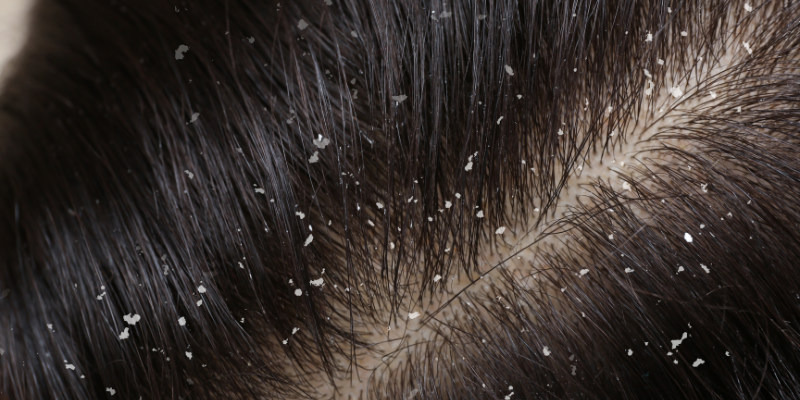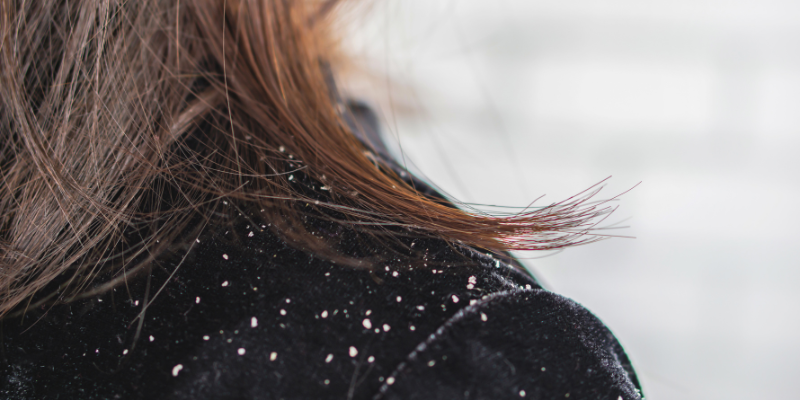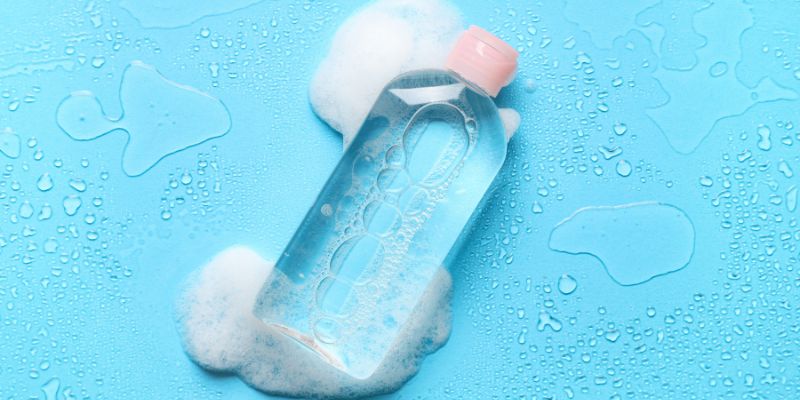Dandruff: Causes and Remedies
Dandruff breaks the skin for many. People feel embarrassed and angered by it despite its size. The itching, swelling, and agony of dandruff may make you feel self-conscious and avoid others. Learn about dandruff causes, treatment, and symptoms. This helps you cope and feel better.

Dandruff signs:
People have varied dandruff symptoms. The most prevalent indicators are:
- Dandruff is white or yellow flaky skin on your head and hair. Small flakes are less visible than large ones. They land on garments, particularly dark ones, making individuals self-conscious and uncomfortable. Dry winter air aggravates itching.
- Many persons with dandruff dislike their itchy heads. Some individuals scratch their heads to relieve moderate to severe itching. Scratching may worsen discomfort by rendering skin red and producing dandruff. Itching and scratching cause physical and emotional suffering for many individuals.
- Patients may also report red or itching heads, mainly where scrapes or swelling are present. Small red areas that sting to the touch may indicate this discomfort. Some individuals get headaches that spread to their cheeks or neck. Inflammation may hurt and need treatment.
- Dandruff may cause greasy hair. People with this indicator may feel guilty about their post-wash hair oiliness. Too much oil on your skin may irritate and produce yeast and bacteria. This sticky setting may worsen seborrhoeic eczema irritation.
- Dandruff may be found and removed using these indications. Those who notice these indicators may require support to manage their condition and restore their hair. Knowing what dandruff looks like may help individuals take better care of themselves. Anyone may get dandruff, regardless of age or hair type. This may make people feel better about having it.
What causes dandruff?
Knowing the reason may help you eliminate dandruff. That's why they matter:
- Seborrhoeic dermatitis may occur on the head due to its abundant oil glands. It leaves crimson, greasy dots with yellow or white scales. Seborrhoeic dermatitis causes most dandruff.
- On the skull, Malassezia yeast grows most often. Overgrowth of yeast causes red, inflamed hair. Stress, hormone fluctuations, or a sticky head may cause too much.
- Dry Skin: Dry skin makes white heads flaky. Flakes don't attach to your skin like seborrhoeic dermatitis or dandruff. Cold, low humidity and harsh hair products may dry skin.
- Shampoo, cream, and styling items may cause allergies. This sensitivity may cause acne and itching.
- Without frequent hair and head washing, oils and dead skin cells may build up and worsen dandruff. Regular hair care is the only method to prevent this issue.
Dandruff may be eliminated by understanding its causes.

How to Treat Headaches:
Nutrition, hair care, and topicals may eliminate dandruff. Possible answers:
- Cleaning hair frequently eliminates dandruff. Visit the restroom twice or thrice a week for greasy or flaky hair.
- A milder shampoo may be better for sensitive skin. Cleansing shampoos may help oily hair. Dry skin may benefit from wet washes.
- Shaking your head in the shower may increase blood flow and transparent flakes faster.
- Simple elegance. Heat may dry and damage hair. Use lower heat with curling irons, dryers, and straighteners to protect your face.
- Stress and dandruff may decrease with yoga, meditation, and deep breathing.
- A diet rich in minerals, vitamins , and fats may keep hair healthy. Hair is hydrated by omega-3s. Sources include nuts, seeds, and seafood.
- Ineffective nonprescription and over-the-counter dandruff treatments? See a doctor. They may give further details and therapy options.
Home Treatment for Dandruff:
Home remedies for dandruff may be used with OTC medications. These options are plentiful:
- Malassezia dandruff may be treated with tea tree oil, which destroys bugs and fungi. Apply olive or coconut oil with tea tree oil on your face. After 30 minutes, wash it off.
- Apple cider vinegar: Its acidity balances hair pH and prevents yeast growth. Use equal quantities of apple cider vinegar and water on your skin. Hold off washing for 1520 minutes.
- Coconut oil softens dry hair. Apply warm coconut oil on your head. Please put it on overnight or for a few hours and wash it off.
- Since it relieves inflammation, aloe vera helps soothe an irritated head. Lay down with fresh aloe vera gel on your head for 30 minutes. Could you get rid of it?
- Lemon Juice: Balances hair pH and removes dandruff. Wash your head after 15 minutes of fresh lemon juice.
- Yogurt contains hair-healthy probiotics. Wash the usual yogurt off your head after 30 minutes.
Treatment for Dandruff:
There are numerous effective methods to treat dandruff when home remedies and lifestyle modifications fail. Some common therapies are
Shampoos sold in stores:
- Dandruff creams without prescription are readily available. Find products with vital compounds like
- Zinc pyrrithione kills yeast and dandruff.
- Selenium Sulphide: Slows skin cell change and thickens, reducing dandruff.
- A ketoconazole shampoo helps Malassezia dandruff.
- Coal tar shampoos reduce itching and redness.
Medicines prescribed:
If over-the-counter medications don't work, a doctor may prescribe stronger ones. Do any of these:
- Topical medications reduce head itching and swelling.
- Oral antifungals may help with severe dandruff.
- Light is utilized,
- Some physicians recommend head UV light therapy. Itching and swelling may improve with this therapy.
Scalp Treatment:
Professional chemical peels or thorough washing may eliminate severe dandruff and enhance scalp health.
Changing your lifestyle:
Managing stress, cleaning hair, and eating healthily may help eliminate dandruff.
Dandruff shampoos:
Choosing the appropriate dandruff shampoo is crucial for treatment success. Check out these popular choices:
- This famous brand offers zinc pyrithione soaps that combat acne and keep skin healthy.
- Selsun Blue treats dandruff and acne with selenium sulfide. It may relieve pain and dryness.
- Nicorette shampoo removes dandruff-causing germs with ketoconazole. It helps for stubborn dandruff.
- Neutrogena T/Gel coal tar shampoo treats acne and rashes. It may prevent hair breakage and itching.
- The DOVE DermaCare shampoo keeps hair moist and fights acne.
Finding the right shampoo for acne and skin type may take time. Follow package instructions for optimum results.
Conclusion:
Dandruff makes many self-conscious. Recognizing causes and symptoms helps control dandruff. Over-the-counter or home medicines may help this persistent ailment. Wash and maintain your hair frequently with the right tools. Stress management and nutrition may improve hair. Chronic dandruff requires medical attention. Physicians may adjust and prescribe better therapy to provide each patient with attention. Dandruff is annoying, but knowing its origins and treatment keeps your skin healthy. Correct dandruff treatment reduces dry skin and boosts confidence. Dandruff may be reduced and improved by using market products, home cures, and professional help.











